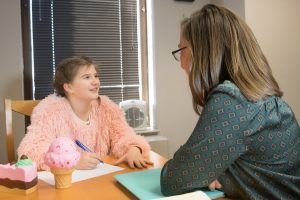Language Delay
One of the most comment diagnoses we hear when we receive referrals from physicians to assess children under the age of three is language delay, also known as development delay. Parents are usually the first to know something does not feel or sound right and often wait for the physician to make a diagnosis or referral to confirm their suspicions.
Whether from a referral or a gut feeling, the comments are similar. They say their child:
- Is not speaking
- Is speaking few words
- Used to use a lot more words
- Has speech/articulation errors
- Forgets the names of things
- Has tantrums
- Appears to not understand
- Is not understood by other people
- Does not speak as well has his/her peer or sibling.
Typically we set the following goals when evaluating and treating a child with a language delay:
- Familiarize the caregiver about a child’s typical development
- Support the caregiver for carryover of any skill taught to the child
- When appropriate, collaborate with other professionals (physicians, teachers, OT, PT)
- Increase the child’s functional language so they do not become discouraged when they are trying to communicate their needs and wants.
Research has shown that children with a language delay can make progress with or without therapeutic support. However, research also indicates a decreased need of additional supports for reading, writing, and listening when the language delay is specifically targeted by a speech and language pathologist.
Language is the basis for all of the academic skills needed to read, write, and listen. Children who have language issues or struggle with language skills typically perform poorly in school. They have difficulty understanding what is said to them, what they read, and expressing their thoughts to others, which can severely affect their social skills.
I find the parents that often think there is an issue are often right on target. Follow your gut: If in doubt, get it checked out. It could be the step to helping your child be successful for life.





